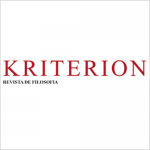A INTERAÇÃO NATURANTE ENTRE O DEMIURGO E O MUNDO, A QUESTÃO DOS “DOIS TIPOS DE MATÉRIA” E A NATUREZA DA “IMPLANTAÇÃO” DAALMA NO CORPO
Kriterion, v.51, n. 122 (2010) • Kriterion: Revista de Filosofia
Autor: Edrisi Fernandes
Resumo:
Em seu Comentário ao Timeu, Proclo diz que em algumas ocasiões Platão fala de um modelo (a partir do qual o mundo é criado) que é idêntico ao Demiurgo, enquanto noutras ocasiões sugere que o modelo é distinto do Demiurgo. Aqui, identidade e diferença remetem à semelhança ou dessemelhança com o inteligível, identificado com a eternidade (estabilidade; fixidez). Ora, Platão também fala no Timeu que o Cosmos é bonito e seu Construtor (o Demiurgo) é bom porquanto fixou a vista no modelo eterno. Se perguntarmos o que é engendrado quando o Demiurgo fixa a vista num modelo que não lhe é idêntico, encontramos a resposta no Timeu: inveja, defeitos, desordem, limitação quanto à inteligência e à alma, incompletude, feiúra e imperfeição. Plotino, por sua vez, menciona (Enéadas, II.4), a existência de dois tipos de matéria, inteligível e sensível. A matéria inteligível ou divina equivale à “Díade indefinida”, identificada com a processão do Noûs. Para Plotino, apesar de a matéria inteligível ser eterna e imutável sua arch? é constituída por diferença e movimento – condições que preparam a naturação da matéria sensível. Para Proclo, a Alma, desdobramento do Noûs, faz a mediação entre o Intelecto, a matéria inteligível e a matéria sensível. Diversos intérpretes parecem ter entendido a matéria inteligível como matéria da Alma, e para explicar a interação entre o inteligível e o sensível muitas teorias surgiram a respeito da constituição da matéria inteligível e sobre a natureza do “veículo” ou “veículos” que estariam associados à “descida” e encarnação da Alma.
Abstract:
In his Commentary on the Timaeus Proclus says that in some occasions Plato speaks of a model (from which the world is created) that is identical to the Demiurge while in other occasions he suggests that the model is distinct from the Demiurge. Here, identity and difference refer to the similarity with or dissimilarity from the intelligible One, identified with eternity (stability; fixedness). However, Plato also speaks in the Timaeus that the Cosmos is pretty and its Constructor (the Demiurge) is good inasmuch as He fixed his sight in the perpetual model. If we ask what is produced when the Demiurge fixed his sight in a model that it is not identical to Himself, we find the reply in the Timaeus: envy, defects, disorder, limitation regarding intelligence and the soul, incompleteness, ugliness, and imperfection. Plotinus, on his turn, mentions (Enneads, II.4) the existence of two types of matter, intelligible and sensible. The intelligible or divine matter is equivalent to the “indefinite Dyad”, identified with the procession of the Noûs. For Plotinus, though the intelligible matter is eternal and invariant, its arch? is constituted by difference and movement - conditions that prepare the naturation of sensible matter. For Proclus, the Soul, an unfolding of the Noûs, mediates between the Intellect, intelligible matter and sensible matter. Many interpreters seem to have understood inteligible matter as the matter of the Soul, and to explain the interaction between the intelligible and the sensible many theories have appeared regarding the constitution of intelligible matter and about the nature of the “vehicle” or “vehicles” that would be associated with the Soul’s “descent” and incarnation.
Texto Completo: http://www.scielo.br/pdf/kr/v51n122/15.pdf
Palavras-Chave: demiurgia,ontogênese,matéria inteligível,maté

Kriterion: Revista de Filosofia
A revista Kriterion, publicação do Departamento de Filosofia da Universidade Federal de Minas Gerais, é a mais antiga do Brasil. Foi fundada em 28 de junho de 1947 e tem a missão de publicar pesquisa original e de alta qualidade em filosofia.
A Revista está indexada, atualmente, em vários importantes catálogos internacionais, como o Philosopher´s Index (EUA), MLA International Bibliography (EUA), Bibliographie de la Philosophie (Louvain, Bélgica), EBSCO (Massachusetts, EUA), SciELO (América Latina), e nacionais, como o CCN/IBICT e o Pergamum. Publica, atualmente, três números por ano. Conceito QUALIS/CAPES periódicos: A1.
